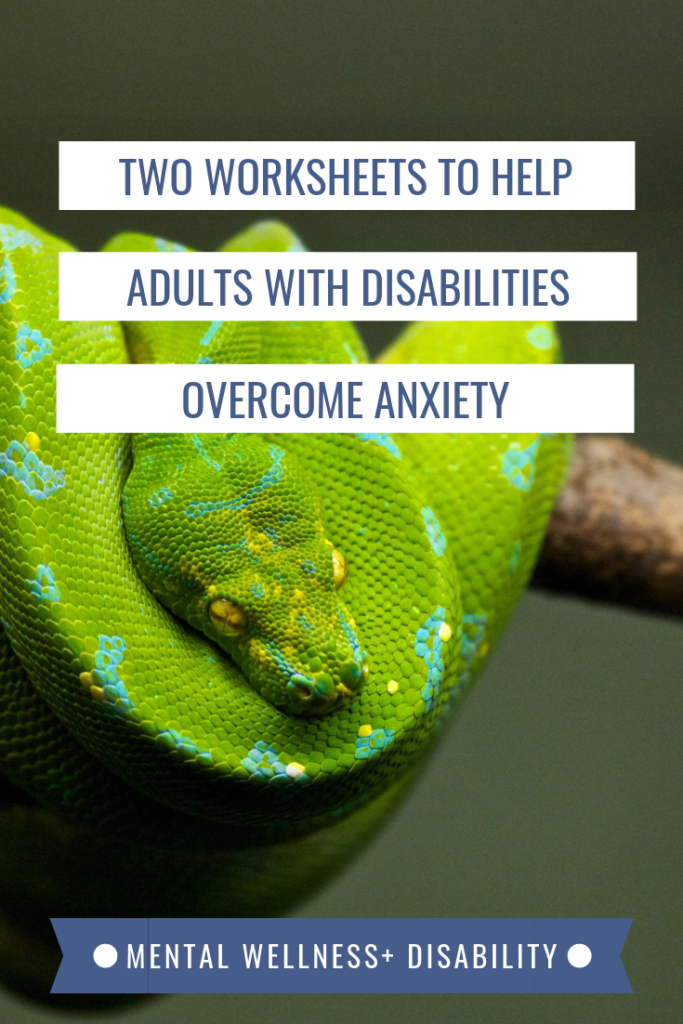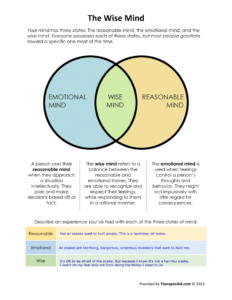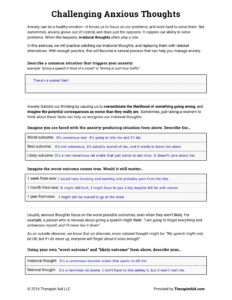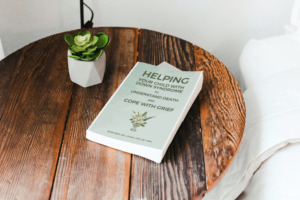A few weeks ago I was at a conference speaking to a room full of self-advocates about recognizing and overcoming anxiety. Someone in the crowd asked me “Do therapists get anxious? How do you do deal with it?” I shared that I don’t just use worksheets to help adults with disabilities overcome anxiety in my counseling practice. I also use them myself in my personal life!

I shared this story with the crowd to illustrate how I cope with anxiety
Autumn is the start of Scouting season for both of my kids, and we do lots of camping. The other day, I went out to my shed to pull out our equipment for an upcoming camping trip.
As I stepped into the shed I heard a sound above my head, a sort of light, crunching sound.
I knew what it was before I looked up.
A snake.
Its large body lay bunched up in the rafters, muscular loops threatening to fall off as it coiled and flexed. Its face was pointing downward, just inches from my own.
Ok, it was probably about 2 feet away…but it FELT like only inches away!
I cursed and then jumped backwards out of the shed as quickly as I could. My heart was racing and I was muttering.
I felt terrified and thought ‘oh there’s no WAY I’m going back in there’.
Read on to learn about what I did next and to download my two favorite worksheets to help adults with disabilities overcome anxiety.
Adults with disabilities can have a lot to be anxious about
Am I missing something?
Adults with disabilities like Autism know that unwritten rules govern lots of social situations. If you don’t follow the ‘rule’ because you don’t know about it, then you get labeled a weirdo or worse. And if you know about the rule and try to follow it, but somehow miss the mark? No one cares how hard you tried. They just see that you ‘aren’t good with people’, and don’t try to include you. Either way, you feel isolated and excluded.
My clients who feel this way often appreciate that I spend time hearing about their fears and getting to understand how truly hard it is, without just doing lots of social skills training. Once a person feels heard and understood, they are usually in a much better place to move forward from.
Will I choose poorly?
Some of my favorite clients have called this feeling as ‘analysis paralysis’. They describe being so fearful of making a wrong choice, that they stay stuck not making any choice at all. Other people may call them unmotivated or lazy. The truth is, they’re just overwhelmed, and so focused on choosing the right thing, that they don’t make any choice at all.
When I help clients who struggle with this, we do lots of evaluating. Not of the pros and cons between choice 1 and choice 2. No, I encourage my clients who are stuck to consider the risks of choosing wrongly versus making no choice at all.
What if no one gets me?
So many of the adults I see for counseling have this worry. They dream of friendships and romantic relationships where they can just be themselves. They are tired of coworkers, neighbors, and acquaintances calling them a loner, weird, annoying, type A, a control freak, hostile, impatient, inflexible, and worse. My clients dream of finding people who appreciate them just as they are.
How I help these clients might surprise you. I don’t point out to them the times that they’re being bristly and give them social skills instruction. I might do this eventually, but not at first. No, the first thing that I do is to connect with my clients authentically, and show them that I genuinely enjoy their company. It shakes your confidence when it feels like no one understands you or wants to spend time with you. It’s easy to question if you’ll ever have friends, or if you’re even worth being friends with. Clients with disabilities who come to counseling feeling this way need me to remind them of the wonderful things that are unique to them.
Yes, there’s a time for learning social skills and considering what you could do differently in social settings. But, when you’re just getting started and have loads of built up social anxiety because of how poorly things have gone in the past? That’s when you need to build trust and remember that you’re worthy.
My two favorite worksheets to help adults with disabilities overcome anxiety
I’ve written before about the benefits of writing things down during therapy.
Many of my clients with disabilities love worksheets for the same reasons that they love keeping a counseling notebook.
- It creates a visual
- It’s easier to recall than a conversation because you can refer back to it
- It’s something you can physically pull out and reference in the future
- Over time, you can look back at old worksheets and mark your progress
Also, it’s manageable. Unlike an open-ended conversation, a worksheet is a tangible, manageable thing to navigate. Talking about problems and solutions can feel overwhelming because you don’t know when you’ll be ‘done’. A worksheet has a visible end. If you can just get to the bottom of the page, you’ll be through the tough stuff.
Challenging anxious thoughts worksheet
This worksheet is all about challenging anxiety by identifying the untrue, unhelpful beliefs that cause our worries to feel overwhelming. You can download a free copy here.
I’ll discuss with clients in counseling that irrational beliefs and thoughts are what allow anxious thoughts to take control. In this worksheet, you work backwards from considering the absolute worst-case scenario. After considering your worst-case fears, you can identify your irrational thought. Finally, you can replace this irrational, worst-case scenario with a most-likely scenario that isn’t rooted in fear.
In my example of having anxiety about the snake in my shed, it might go like this (my writing is in blue).
Using your Wise Mind worksheet
This worksheet is about accepting your anxiety, but also realizing that your anxiety isn’t the only thing going on. You can download a free version here.
This visual Venn diagram makes the case that between cold reality and the heat of emotion, there is a sweet spot called your wise mind.
You can accept that we are having a big emotion, so big it wants to control you. But you can also recognize that there are facts and evidence that are opposed to your big feelings. When you put your emotional and rational minds at odds, you can arrive at the place of balance. The name for this balanced place is the Wise Mind.
Your wise mind allows you to acknowledge your fear, consider the facts to the contrary, and move forward.
This doesn’t mean that your fear is wrong, only that it’s not the only thing that’s true.
This worksheet is especially helpful for people who are prone to emotional reasoning, or falling into the trap of “I feel it, therefor it’s true”.
Here’s how this worksheet might look in my snake example (again, my writing is in blue).
I hope that you find one or both worksheets helpful!
People with disabilities can overcome their anxiety, and worksheets like these can help. They can even help the mental work feel more fun, like a puzzle that you just need to work at until you figure out where all the pieces go.
Keep reading
Other posts you may be interested in
How to Know if Someone is a Real Friend. A Quiz for Teens and Adults with IDD.
In my counseling practice, I offer mental health counseling for teens and adults with IDD. Many of my clients who have Down syndrome, Cerebral palsy, and other disabilities have lots of meaningful friendships in their lives. But sometimes, they ask “how can I know if someone is a real friend?” Maybe you have a friend […]













